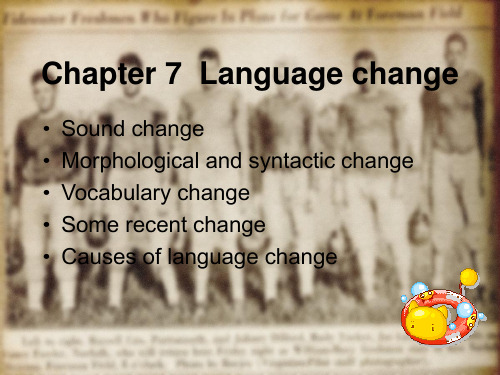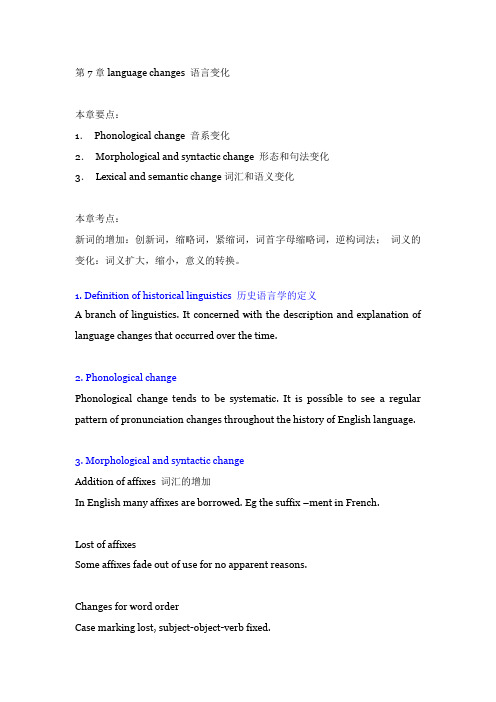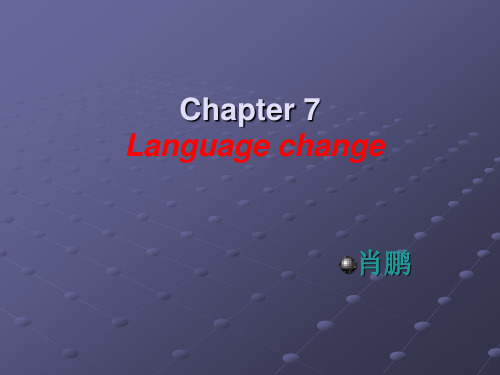语言学导论-第7章Language change
- 格式:ppt
- 大小:258.00 KB
- 文档页数:29


Chapter 7 Language Change Introduction►Change as a universal factTime changes all things: there is no reason whylanguage should escape this universal law.–Ferdinand de Saussure, linguist (1857-1913) ►Gradual, almost imperceptible语言的发展►语言是人类社会的产物,随着社会的发展变化,语言也在不断地发展变化。
语言的发展指语言的历史变化。
语言在不断地发展变化着,只是它的速度极其缓慢,以致我们有时很难察觉。
如:唐代白居易的名篇《长恨歌》前四句:―汉皇重色思倾国,御宇多年求不得,杨家有女初长成,养在深闺人未识。
‖如古汉语里的:时不我待;走;钟►所谓语言的发展演变应该是指不同时期语言系统的发展变化。
临时性的语言调整不能视为语言在发展变化。
换句话说,我们今天能够认识到的所谓语言的变化,最初只是以个别人的个别临时用法的面貌出现的,它很可能不被接受,至少不被多数人接受。
它最终被大家认可需要一定的时间,更重要的是自身要有一定的价值,例如具有独到的表达效果,方便快捷等。
如:同志;网吧;QQ;Google语言发展的特点►语言处于不断的变化发展中。
跟其他任何事物一样,语言的发展有着自身的特点。
概括起来说,语言发展具有渐变性和不平衡性。
1 渐变性渐变性是指语言的发展是渐变的,而不是突变的,是通过语言内部旧质要素的逐渐消亡和新要素的逐渐积累来实现的。
如在古英语中,复数名词的所有格由词尾–a 表示,在现代英语中这种语法手段全都消亡了。
hāma --- homes’hūsa --- houses’hāmes --- home’s2 不平衡性语言发展的不平衡性有两方面的含义:一是指各种语言或方言发展速度是不平衡的,二是指同一种语言内部各要素的发展速度是不平衡的。

第7章language changes 语言变化本章要点:1.Phonological change 音系变化2.Morphological and syntactic change 形态和句法变化3.Lexical and semantic change词汇和语义变化本章考点:新词的增加:创新词,缩略词,紧缩词,词首字母缩略词,逆构词法;词义的变化:词义扩大,缩小,意义的转换。
1. Definition of historical linguistics 历史语言学的定义A branch of linguistics. It concerned with the description and explanation of language changes that occurred over the time.2. Phonological changePhonological change tends to be systematic. It is possible to see a regular pattern of pronunciation changes throughout the history of English language.3. Morphological and syntactic changeAddition of affixes 词汇的增加In English many affixes are borrowed. Eg the suffix –ment in French.Lost of affixesSome affixes fade out of use for no apparent reasons.Changes for word orderCase marking lost, subject-object-verb fixed.Change in negation ruleEg. I love thee not.>I do not love thee.4 lexical and semantic change(1)Addition of new words 新词的增加A: coinage/inventionA new word can be coined outright to fit some purpose. Eg: walkman, Kodak, FordB: clipped wordsClipping refers to the abbreviation of longer words or phrase.Eg gym-gymnasiumExpo- expositionMemo-memorandumDisco-discothequeC: blendingA blend is a word formed by combining parts of other words.Eg smog = smoke+fogMotelBrunch = breakfast+lunchD: AcronymsAcronyms are word derived from the initials of several words. Eg BBC VOAE: Back-formationDeleting the affixes. Egto automate 自动化←automationto legislate 立法←legislationF: Functional shiftWord-class shift from one to another. Eg noun-verb loveG:Borrowing 借词法(2)Loss of words 词汇的废弃Eg beseem – to be suitableWot – to knowGyve – a fetter(3) change in the meaning of wordsSemantic broadening 词义扩大Holiday 原形是holy day 神圣的宗教节日,现在指不用上班的时间。



Chapter 7 Language ChangeThe nature of language changeLanguage change is inevitable, universal, continuous and, to a considerable degree, regular and systematic.Language change is extensive, taking place in virtually all aspects of the grammar --- in phonology, morphology, syntax, lexicon, and semantics. Language change is never an overnight occurrence, otherwise, communication would be impossible.1. Sound change1. 1 Vowel sound changeGreat Vowel Shift , which occurred at the end of the Middle English period, approximately between 1400 and 1600 and which involved 7 long vowels, led to one of the major disagreements between the pronunciation and the spelling system of Modern English.1. 2 Sound lossIn Old and Middle English, /k/ sound in /kn - / clusters in the word - initial position was pronounced, but in modern English, this /k/ is lost in such words as "knight" and "knee.“1. 3 Sound additionSound addition includes the gain or insertion of a sound. A change that involves the insertion of a consonant or vowel sound to the middle of a word is known as epenthesis,1. 4 Sound movementMetathesis refers to sound change because of a reversal in the positions of two neighboring sounds. For example, Modern English word “bird” is the result of the the reversal of the two neighboring sounds /r/ and/i/ in the Old English word "bridd" ("bird")2 Morphological change2. 1 Affix lossIn Old English, the affix “-bora”, which was added to a noun to indicate the performer of the action, was now lost in Modern English.mund ("protection") + bora mundbora ("protector")2. 2 Affix additionThe affix "-able" and “-ment” were added to the English morphological system because of the words such as “favourable” and “accomplishment” borrowed from the Fre nch language.3. Syntactic change3. 1 Rule lossIn Old English, there was a morphosyntactic rule of adjective agreement, according to which, the endings of adjectives must agree with the head noun in case, number, and gender. But this syntactic rule has been lost in modern English.3. 2 Rule additionThe particle movement rule is a syntactic rule added to Modern English. This rule allows the particle in some phrasal verbs to be shifted to the right of the object. This particle movement is impossible in Old English.3. 3 Rule changeIn Middle English, “not” was added to the end of an affirmative sentence to make it negative. But in Modern English, the negation is often made with “not” inserted between the auxiliary verb and the main verb.Old English had an elaborate case-marking system. The grammatical functions were well revealed with case markers. This system made the word order of Old English more variable than that of Modern English.2. 4 Lexical changeMany words, which were used in Old English or Middle English have fallen out of use in Modern English. For example: demiss, ere, oft, wot, beseem, wer, aught, thee, thou, thy. Some of them can still be found in compound words or idioms, such as were-wolf.2. 4. 2 Lexical additionThe history of English lexical expansion is one that is characterized with heavy borrowing and word formationNew words, which are added to English, can also be formed by using such word formation rules 2.5 Semantic change2. 5. 1 Semantic broadeningSemantic broadening refers to the process in which the meaning of a word becomes more general or inclusive than its historically earlier denotation.2. 5. 2 Semantic narrowingSemantic narrowing is a process in which the meaning of a word becomes less general or inclusive than its historically earlier meaning.2.5.3 Semantic shiftSemantic shift is a process of semantic change in which a word loses its former meaning and acquires a new, sometimes related, meaning.The causes of language changeMost linguists believe that physiological, linguistic or sociological factors all contribute to language change5. 1 Sound assimilationImpossible, Irregular, illogical.5. 2 Rule simplification and regularizationRule simplification and regularization means to regularize or simplify an irregular rule5. 3 Internal borrowingInternal borrowing means that speakers of a particular language borrow a rule from one part of the grammar and apply it generally.TransformationsIn most situations, English forms the past tense by adding –ed to the end of a verb. English speakers may borrow this rule and apply it to the situations where the rule was formerly not used.5. 4 ElaborationRule elaboration occurs when there is a need to reduce ambiguity and increase communicative clarity or expressiveness.5. 5 Sociological triggersRadical socio-political changes such as wars, invasions, occupation, colonialization, and language planning and standardization policies lead to vigorous language changes.5. 6 Cultural transmissionAnother reason for language change is the need to create new word and expression to refer to newly developed concepts and new things.5.7 Children's approximation toward the adult grammarChildren are exposed to diverse linguistic information,which makes it impossible for children’s grammar to be identical to adults’. Children tend to simplify and regularize grammatical rules, particularly when they see adults use certain rules optionally.。
Chapter 7 Language change语言变化知识点:1.*Definition: clipping; blend; acronym; back-formation2.Morphological and syntactic change3.*Vocabulary change4.Some recent trends in language change5.Causes of language change考核目标:识记:Definition: clipping; blend; acronym; back-formation领会:Morphological and syntactic change; Vocabulary change简单应用:Some recent trends in language change; Causes of language change一、定义1. Clipping略写词:A kind of abbreviation of otherwise longer words or phrases.指比较长的词或短语的缩写2. Blending 混合法:A process of forming a new word by combining parts oftwo other words.3. Acronym首字母缩略词:words derived from the initials of several words通过组合每个词的首位字母构成新词4. Back-formation 逆向构词法:new words are formed by taking away thesuffix of an existing word. 新词可以通过“去掉”现存的词的后缀而被创造出来二、知识点7.2 Phonological changes元音变化One of the most obvious change in English is the systematic and regular change in theAround the death of Chaucer in 1400,元音开始了进一步的转变。
Chapter 7 Language change⏹Sound change⏹Morphological and syntactic change⏹V ocabulary changeMorphological and syntactic change⏹Change in “agreement” rule⏹Change in negation rule⏹Process of simplification⏹Loss of inflectionsV ocabulary change⏹Addition of new words⏹Loss of words⏹Changes in the meaning of wordsAddition of new words⏹coinage(创新词)⏹clipped words(缩略词)⏹blending(紧缩法)⏹acronyms(词首字母缩略词)⏹back-formation(逆构词法)⏹functional shift⏹borrowingCoinage----A new word can be coined outright to fit some purpose, e.g.⏹walkman⏹Kodak⏹Xerox⏹Ford⏹Benz⏹ToyotaClipped words----The abbreviation of longer words or phrases, e.g.⏹gym—gymnasium⏹memo—memorandum⏹disco—discotheque⏹fridge—refrigeratorBlending----A blend is a word formed by combining parts of other words, e.g.⏹smog—smoke + fog⏹motel—motor + hotel⏹camcorder—camera + recorderAcronyms----Acronyms are words derived from the initials of several words, e.g.⏹CBS---- Columbia Broad casting system⏹ISBN----International Standard Book Number⏹WTO WHO PLA AIDS UNESCO APEC OPEC CAD SARSBack-formation----New words may be coined from already existing words by “subtracting” an affix thought to be part of the old word.⏹edit ← editor⏹hawk ← hawker⏹beg ← beggar⏹baby-sit ← baby-sitterFunctional shift----Words may shift from one part of speech to another without the addition of affixes, e.g.⏹Noun→verb: to knee, to bug, to tape, to brake…⏹Verb→noun: a hold, a flyby, a reject, a retreat…⏹Adj.→verb: to cool, to narrow, to dim, to slow…⏹Adj.→noun: a daily, a Christian, the rich, the impossible…Borrowing⏹----When different cultures come into contact, words are often borrowed from one language to another. The following are some of the loan words in English (see more in P100-101).⏹Latin bonus education exit⏹German beer waltz quartz⏹Chinese tea kowtow sampan⏹Russian sputnik commissar vodka⏹Arabic zero algebra alcoholLoss of words⏹Words can be lost from a language as time goes by. The following words, taken from Romeo and Juliet, have faded out of the English language.⏹Beseem →to be suitable⏹Wot →to know⏹Gyve → a fetter⏹Wherefore →whyChanges in the meaning of words⏹Widening of meaning⏹Narrowing of meaning⏹Meaning shiftWidening of meaning⏹Holiday: [+specific] holy day[+general] any rest day⏹Tail: [+specific] tail of a horse[+general] tail of any animalOther examples: virtue, quarantine, companionNarrowing of meaning⏹hound: any doga special kind of dog⏹girl: young person of either sexyoung people of female sex⏹deer: any animala particular kind of animal⏹meat: foodedible part of an animal⏹corn: graina particular grainOther examples: knight, wifeMeaning shift⏹inn: a small, old hotel or pubwell-known, nice hotel⏹nice: ignorant (1000 years ago)good, fine⏹lust: pleasurewith negative and sexual overtones⏹silly: happynaïve, foolishOther example: gay, CadillacSome recent trends⏹Moving towards greater informality⏹The influence of American English⏹The influence of science and technologyThe influence of science and technology⏹Space travel⏹Computer and internet language⏹EcologyCauses of the language change⏹The rapid development of science and technology;⏹More and more women have taken up activities formerly reserved for men, more neutral job titles have been created;⏹“ Economy of memory” results in grammar simplification;⏹Regularization of exceptional plural forms provides another example for analogical change.Causes of Lexical Change1. PoliticsGround Zero, Osamaniac, Blairism, CIS, Hamas, Tamil Tiger2. Science and TechnologyDVD, PDA, squark, hacker, cursor3. Economic DevelopmentBushnomics, Blairnomics, Blairnomicsdownsize, human resource, electronic commerce4. Social lifeYuppies, DINK, SOHO, physically challenged,5. Environmentbio-diversity, ecosystem, ecocide, green consumer, green speech, tree houses, twigloo, intensive farming, pesticide6. Health and Fitnessmad cow disease, bird flu, foot and mouth disease, SAD, magnetic resonance imaging (MRI)7. Other Aspects: extreme skiing, bungee jumping, hydrospeeding。
Chapter 7 Historical Linguistics 历史语言学1. The purpose and significance of the historical study of language 研究语言变化的目的和意义The historical study of language is of great importance to our understanding of human languagesand human linguistic competence.Researches in historical linguistics shed light on prehistoric development in the evolution oflanguage and the connections of earlier and later variants of the same language, and providevaluable insights into the kinship patterns of different languages.The historical study of language also enables us to determine how non-linguistic factors, such associal, cultural and psychological factors, interact over time to trigger linguistic change.研究语言变化对于理解人类语言和人类的语言能力极其重要。
历史语言学的研究成果揭示语言变化的史前发展和同一语言早期和后期变体自己的联系,为不同语言的亲缘关系提供线索。
历史语言学的研究还可以使我们对非语言的因素,如社会文化和心理因素等在语言变化过程中所起的作用有更深的认识。